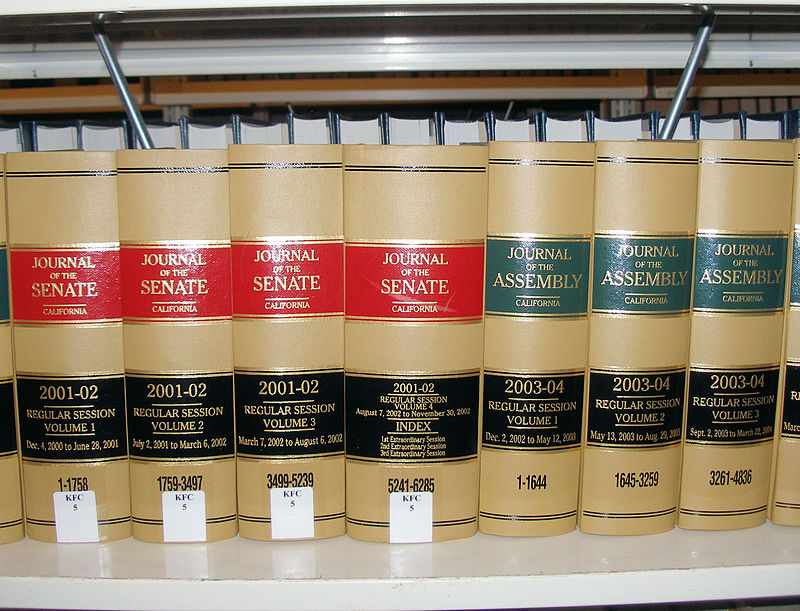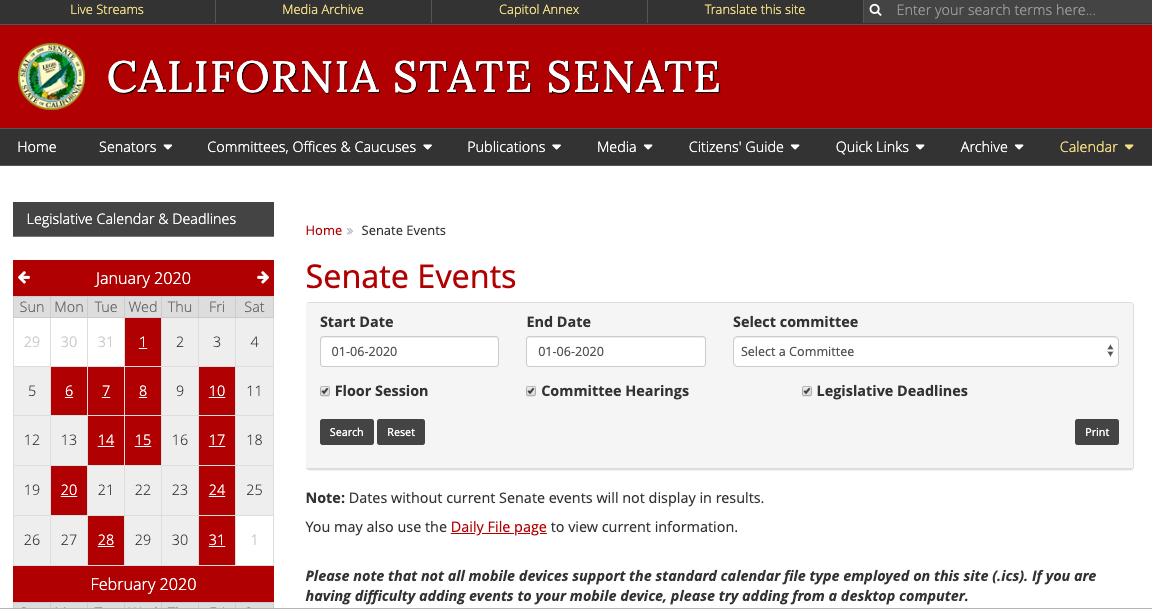
Journals of the California Legislature. (Photo: Wikipedia)
Legislative Operations During Emergencies
Can the Legislature Conduct Business Remotely?
By Chris Micheli, March 29, 2020 2:00 pm
If the Legislature decides to proceed with remote hearings and voting, how will members of the public participate?
As a result of the COVID-19 outbreak, numerous state legislatures around the country have acted upon or are considering measures to deal with legislative operations, such as recesses and bill deadlines. And, as in other states, California’s Legislature is examining whether it can conduct its official business remotely. California, like many other states, provides for legislative operations during emergencies and the state constitution speaks to such circumstances.
Recess
At least half of the state legislatures have temporarily adjourned or recessed their legislative sessions so far. California is one of the states that has a constitutional provision that requires the consent of both houses of the state legislature to recess. Article IV, Section 7(d) of the state constitution provides, “neither house without the consent of the other may recess for more than 10 days or to any other place.” This is done by a resolution, which occurred on March 16 and so the Legislature is in recess until April 13.
Special Sessions
In 36 states, the governor and the legislature have the ability to convene a special session. In the remaining 14 states, however, only the governor has that authority. In California, a “special” session is one convened pursuant to a proclamation issued by the Governor. Pursuant to Article IV, Section 3(b) of the state constitution, “on extraordinary occasions the Governor by proclamation may cause the Legislature to assemble in special session. When so assembled it has power to legislate only on subjects specified in the proclamation but may provide for expenses and other matters incidental to the session.”
While the Legislature must convene the special session once it has been called by the Governor, there is no legal requirement that any legislation be enacted, nor even be voted upon. Aside from the fact that a special session is limited to the subject matter for which it was called, there are no significant differences in legislative process between a regular and special session.
However, the effective dates for bills enacted during a special session are somewhat different than those for a regular session. Regular session bills, except urgency clause bills that take effect when the Governor signs them, generally take effect on the following January 1. On the other hand, special session bills take effect on the 91st day after adjournment of the special session.
Both regular sessions of the Legislature and any special sessions not previously adjourned are adjourned sine die at midnight on November 30 of each even-numbered year. As such, neither a regular nor a special session will continue indefinitely.
Remote Voting
At least eight states are reviewing electronic or remote meetings and voting during this pandemic. However, many state constitutions require legislatures to meet in person. As a result, the legislatures in many of these states may be precluded from passing a resolution or adopting a statute to allow remote meetings or voting by state legislators.
As the National Conference of State Legislatures explains, “In normal circumstances, legislatures typically operate under a ‘you must be present’ rule—that is, legislators must be physically present in committee or on the chamber floor to participate in debate or voting. The rationale for this rule centers on the integrity of the legislative process. Requiring members’ physical presence creates a comfort level that procedures can more easily be controlled and the public can witness debate and voting. State legislatures, however, more often allow the use of technology to facilitate public input into committee meetings.”
In two states—Oregon and Wisconsin—specific provisions allow remote or virtual meetings of the legislature if emergencies exist. In 2012, Oregon voters approved a constitutional amendment relating to catastrophic disaster. Wisconsin’s constitutional provision on continuity of civil government allows the legislature to “adopt such other measures that may be necessary and proper for attaining the objectives of this section.” In both instances, the state legislatures are relying upon grants of authority under their respective constitutions.
In California, we have to look at our state constitution, Article IV, Section 7. Prior to the adoption by the voters in 2016 of Prop. 54, Section 7(c) already provided: “The proceedings of each house and the committees thereof shall be open and public.” As a result of the passage of Prop. 54, this constitutional provision was strengthened by language that begins, “The right to attend open and public proceedings…” There are exceptions in the state constitution, but those are for the traditional closed sessions to consider employment or security matters or to confer with legal counsel.
There are also provisions of the California Government Code that provide that the “seat of state government” is in the City of Sacramento. While the Governor by proclamation can designate a different seat of government, that is only allowed during war or an enemy-created disaster pursuant to Government Code Section 450.
In a similar vein, the Joint Rules (see JR 60(a)) prohibit bill actions from occurring outside the State Capitol. This is why only “informational hearings” can be conducted around the state by legislative committees, but no bills can be considered or voted upon.
This begs the question whether the Legislature can conduct any remote voting or any other official business outside the State Capitol.
Nonetheless, California’s State Senate adopted SR 86 on March 16, which added Rule 56 to the Senate Rules, and is entitled, “remote participation in meetings during emergencies.” It would allow committees to conduct remote meetings by electronic means and allow senators to participate remotely in those proceedings. The State Assembly has not adopted any such rule and the Joint Rules have not been amended.
If the Legislature decides to proceed with remote hearings and voting, how will members of the public participate? Ultimately, the practical question would be whether someone or some group would sue to overturn a statute that was passed utilizing remote voting. And, if so, would a state court overturn such a statute under these circumstances?
- Location of a Missing Party in Child Custody Cases - December 31, 2025
- Valuation for Eminent Domain - December 31, 2025
- Third Quiz on Where Areas of Law Are Found in the California Codes - December 30, 2025




